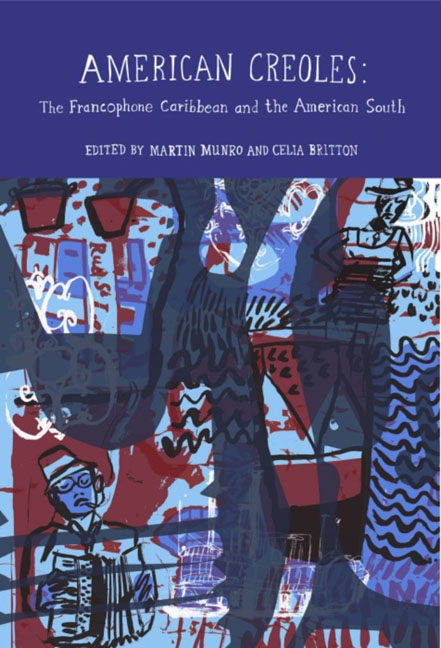Book contents
- Frontmatter
- Contents
- List of Illustrations
- Acknowledgements
- Introduction
- Creolizations
- Music
- Intertextualities: Faulkner, Glissant, Condé
- Go Slow Now: Saying the Unsayable in édouard Glissant's Reading of Faulkner
- Édouard Glissant and the Test of Faulkner's Modernism
- The Theme of the Ancestral Crime in the Novels of Faulkner, Glissant, and Condé
- An American Story
- Notes on Contributors
- Index
An American Story
from Intertextualities: Faulkner, Glissant, Condé
- Frontmatter
- Contents
- List of Illustrations
- Acknowledgements
- Introduction
- Creolizations
- Music
- Intertextualities: Faulkner, Glissant, Condé
- Go Slow Now: Saying the Unsayable in édouard Glissant's Reading of Faulkner
- Édouard Glissant and the Test of Faulkner's Modernism
- The Theme of the Ancestral Crime in the Novels of Faulkner, Glissant, and Condé
- An American Story
- Notes on Contributors
- Index
Summary
1963 – I was twenty years old, the age at which we thrust words taut as fists into the sun's face, when we burn through the days so as not to drag into old age. I had left for America as one summons life, without even waiting for it to beckon. In New York, more than a woman, black, or a student, I was an escapee. I was looking for a way out. Dense thickets still blocked many paths to me when, two years after my arrival, I met Scott Bradley, a black lawyer of the NAACP. In the eyes of exiled Haitians, I became from that moment on a sort of spoils of war to black Americans. Few were those in 1965 who understood that I was going from one anguish to another. And even today I suspect that they didn't want to change the world so much as to Haitianize it, remake it in the image of their own wounds.
Luc must have smiled at me, but I am not sure. Maybe I wanted so badly for it to be thus that I believed it. It was raining, one of those tropical downpours, a straight rain, falling with no reprieve, no pity. I had taken refuge on the porch of the haberdashery where my mother had sent me to buy string. It was the month of September, and she was preparing our uniforms for the start of school in October. Rain in the tropics is always either miracle or upheaval, as if it could not content itself with being ordinary as it did under other skies. And squeezed against each other on that porch, we were already linked by those waters that would just as soon make fruit grow as tear down walls or bury bodies. Joy at the sight was already marred by the imminence of disaster setting its huge dark wings somewhere. But for me, the world still smelled of innocence, and I felt both lost and happy as if in a huge shell of water. And it is perhaps because I thought him as lost and happy as I was that, turning, I saw Luc smile. He was talking to François and smiling.
- Type
- Chapter
- Information
- American CreolesThe Francophone Caribbean and the American South, pp. 230 - 239Publisher: Liverpool University PressPrint publication year: 2012

